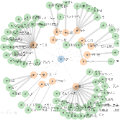Fact-checking is a crucial task as it ensures the prevention of misinformation. However, manual fact-checking cannot keep up with the rate at which false information is generated and disseminated online. Automated fact-checking by machines is significantly quicker than by humans. But for better trust and transparency of these automated systems, explainability in the fact-checking process is necessary. Fact-checking often entails contrasting a factual assertion with a body of knowledge for such explanations. An effective way of representing knowledge is the Knowledge Graph (KG). There have been sufficient works proposed related to fact-checking with the usage of KG but not much focus is given to the application of reinforcement learning (RL) in such cases. To mitigate this gap, we propose an RL-based KG reasoning approach for explainable fact-checking. Extensive experiments on FB15K-277 and NELL-995 datasets reveal that reasoning over a KG is an effective way of producing human-readable explanations in the form of paths and classifications for fact claims. The RL reasoning agent computes a path that either proves or disproves a factual claim, but does not provide a verdict itself. A verdict is reached by a voting mechanism that utilizes paths produced by the agent. These paths can be presented to human readers so that they themselves can decide whether or not the provided evidence is convincing or not. This work will encourage works in this direction for incorporating RL for explainable fact-checking as it increases trustworthiness by providing a human-in-the-loop approach.
翻译:暂无翻译




